The Psychological Aspects of Adjusting to Life on Parenteral Nutrition
Understanding the Psychological Journey with Parenteral Nutrition
Transitioning to parenteral nutrition (PN), including total parenteral nutrition (TPN) and home parenteral nutrition (HPN), is a life-altering experience not only medically but psychologically. As patients and their families adjust to this routine, they face significant emotional and mental health challenges. This article delves into the intricate psychological landscape associated with living on parenteral nutrition, examining the emotional hurdles, the importance of support systems, and effective coping strategies to enhance well-being.
Psychological Impacts and Emotional Challenges of Parenteral Nutrition
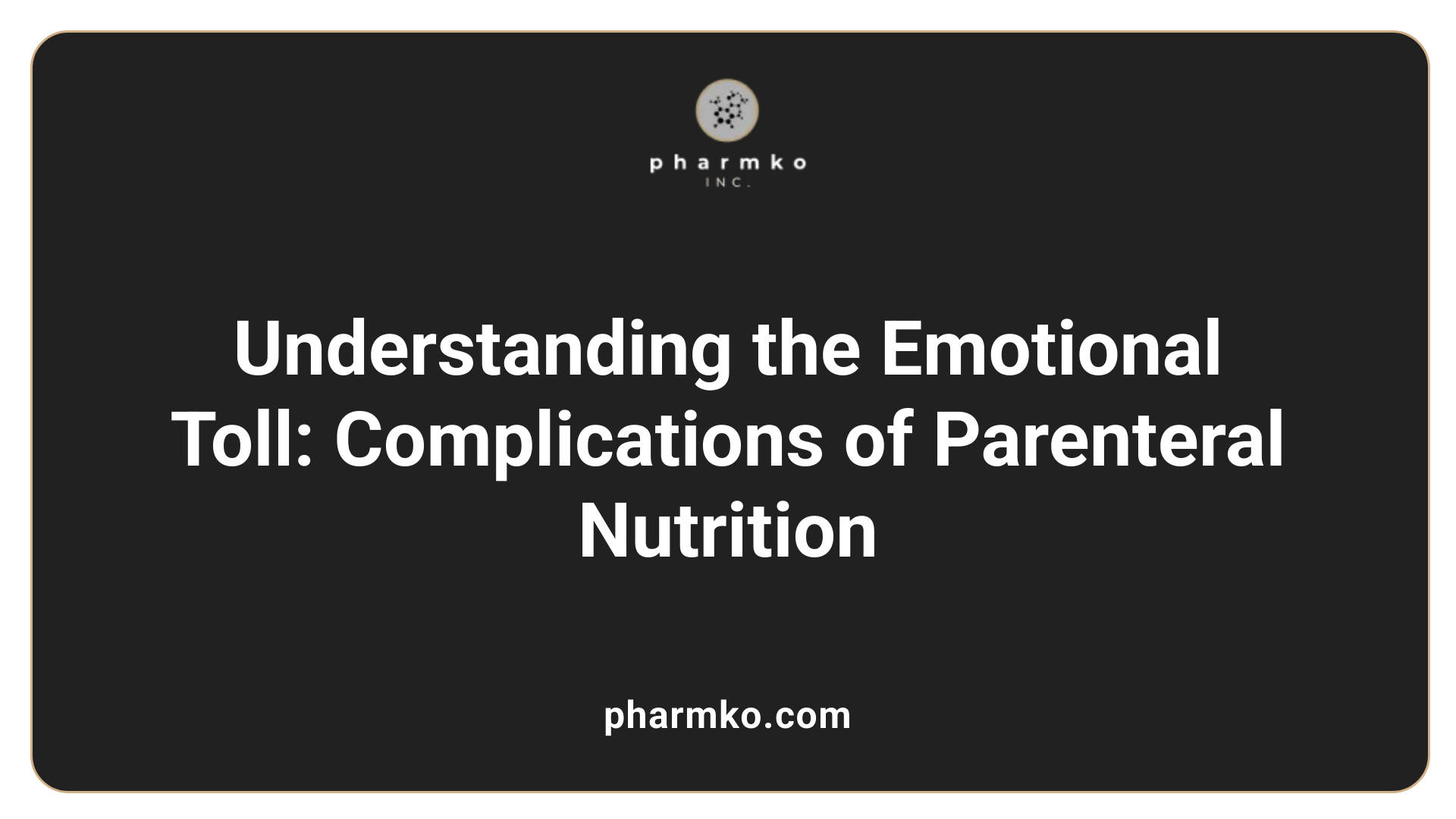
What are common complications associated with TPN therapy?
Common complications associated with Total Parenteral Nutrition (TPN) include:
- Dehydration and Electrolyte Imbalances : These can significantly disrupt the body's fluid and chemical levels, leading to further health complications.
- Thrombosis : The formation of blood clots is a risk primarily due to the catheter used to administer TPN.
- Hyperglycemia : High glucose content in TPN solutions can cause elevated blood sugar levels, while sudden cessation can lead to hypoglycemia.
- Infection : A major concern related to the central line used for TPN, which increases the risk of sepsis and other serious infections.
- Long-Term Liver Failure : Prolonged use of TPN can cause liver dysfunction, especially if the nutritional solution lacks essential vitamins and minerals, alongside potential micronutrient deficiencies.
How do anxiety and depression manifest in patients on parenteral nutrition?
Patients on parenteral nutrition frequently experience anxiety and depression, stemming from the psychological adjustments required due to lifestyle changes. Facing the loss of normal eating can lead to:
- Fear and Sadness : Feelings of exclusion from social eating situations contribute to emotional distress.
- Social Isolation : Dependency on TPN can result in significant loneliness and a perceived burden on families, further aggravating mental health issues.
What body image issues arise with the use of parenteral nutrition?
The initiation of parenteral nutrition often leads to considerable body image concerns, particularly due to:
- Presence of Central Line Catheters : This can alter appearance and clothing choices, affecting self-esteem.
- Disruption of Routines : Patients may experience shifts in their social dynamics that worsen feelings of self-consciousness and affect their psychological health.
How do lifestyle changes impact those on TPN?
The transition to TPN requires significant lifestyle adjustments, which encompass:
- Daily Routine Alterations : Patients must adapt their schedules around nutritional infusions, impacting work and social activities.
- Emotional Challenges : These vast changes can provoke a sense of loss, adding to emotional burdens, and necessitate ongoing psychological support for adjustment.
Coping Strategies and Building Resilience
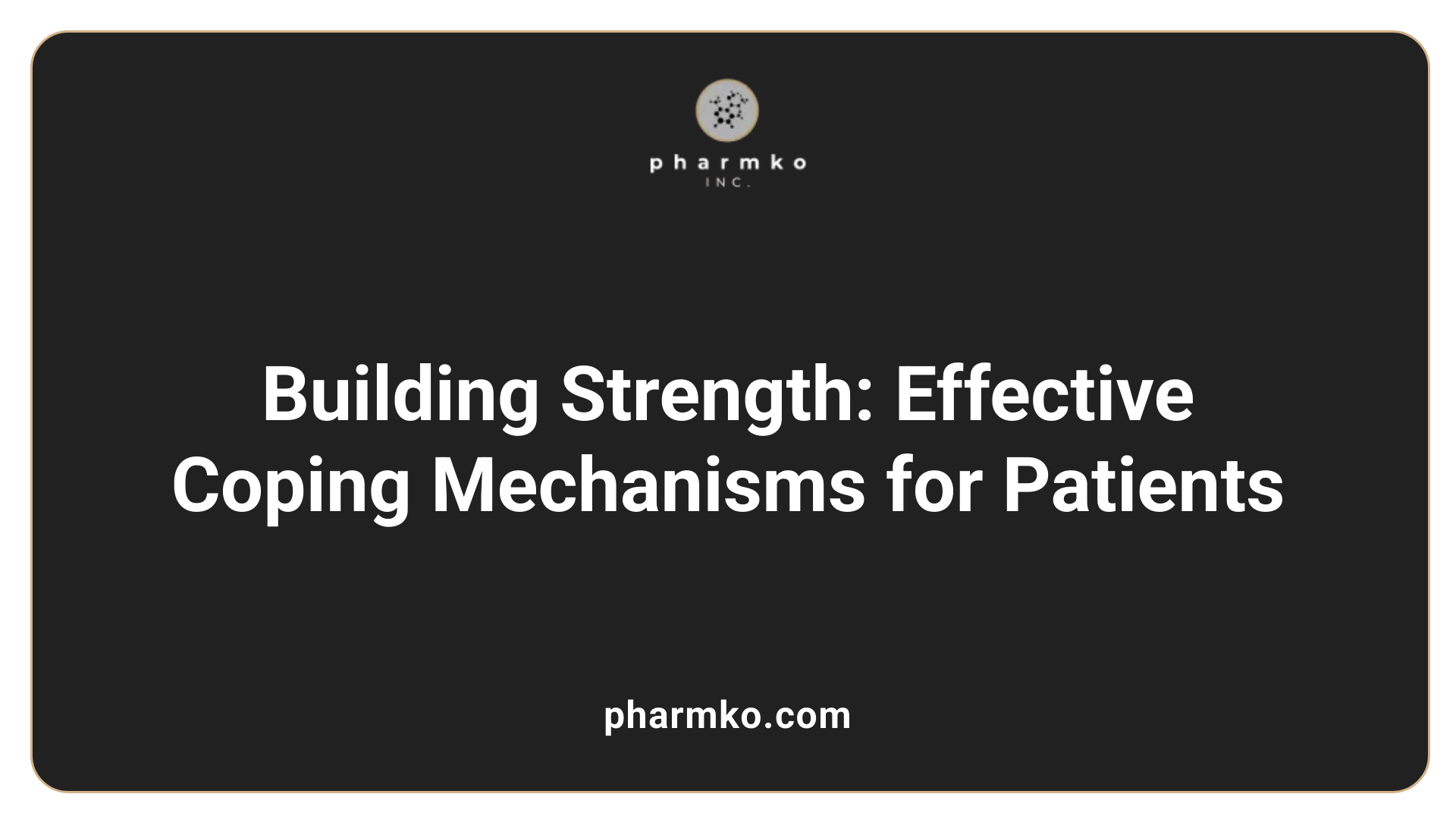
What are the disadvantages of parenteral nutrition?
The major disadvantages of parenteral nutrition relate to complications arising from the intravenous presence of a foreign body and the potential for unphysiological manipulation of nutrient intake. These complications can lead to a range of issues, including infections, thrombosis, and metabolic disturbances.
Coping mechanisms
To effectively navigate the emotional landscape of parenteral nutrition, individuals must develop successful coping strategies. Common approaches include:
- Building a strong support network of family and friends.
- Engaging in relaxation and mindfulness techniques to manage stress and anxiety.
- Joining online communities to combat feelings of isolation and loneliness.
Psychological support
Access to psychological support is crucial. Patients experiencing depression and anxiety should be encouraged to connect with mental health professionals. Strategies can include:
- Psychotherapy tailored for chronic illness.
- Family therapy to improve communication and understanding.
- Support groups for shared experiences and strategies.
Building resilience
Resilience can be strengthened by promoting personal responsibility and encouraging activities that foster a sense of normalcy. Managing body image through discussions and education about the physical changes related to parenteral nutrition is vital. Patients who cultivate a positive mindset tend to adjust better to their new lifestyle.
Family Dynamics and Support Systems in Adjustment
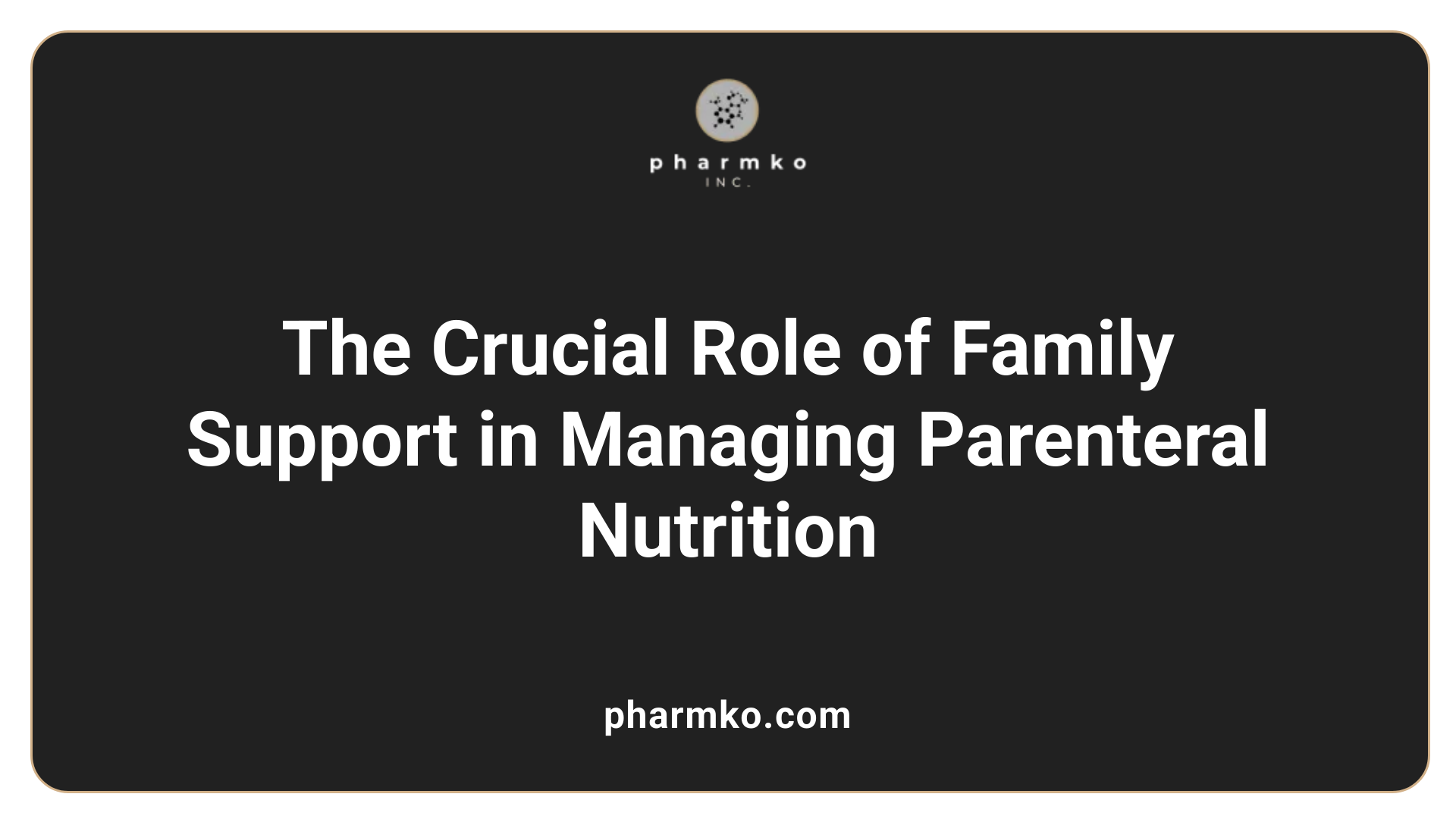
Role of Family
Family plays a pivotal role in the adjustment of patients undergoing Home Parenteral Nutrition (HPN). Supportive family environments can significantly enhance emotional well-being, reducing feelings of isolation and depression that often accompany the adaptation process. It fosters open communication and understanding, encouraging patients to express their fears and concerns about their condition.
Emotional Support Within Families
Emotional support is vital as patients navigate the challenges of HPN. Family members can help mitigate feelings of helplessness and provide a sense of belonging. Active engagement in discussions about nutrition and health can strengthen the familial bond, reinforcing the patient's coping mechanisms. Couples experiencing strain may find that establishing routines around meals can facilitate better emotional connectivity.
Impact on Family Dynamics
Adjustment to HPN also impacts family dynamics, often leading to shifts in roles within the household. Parents face the emotional burden of managing their children's nutrition while coping with their feelings of guilt and helplessness. This can lead to conflicts, especially surrounding social eating situations. Thus, addressing these dynamics through family support systems is crucial in promoting psychological resilience and cohesion.
Mental Health Issues and Quality of Life on Parenteral Nutrition
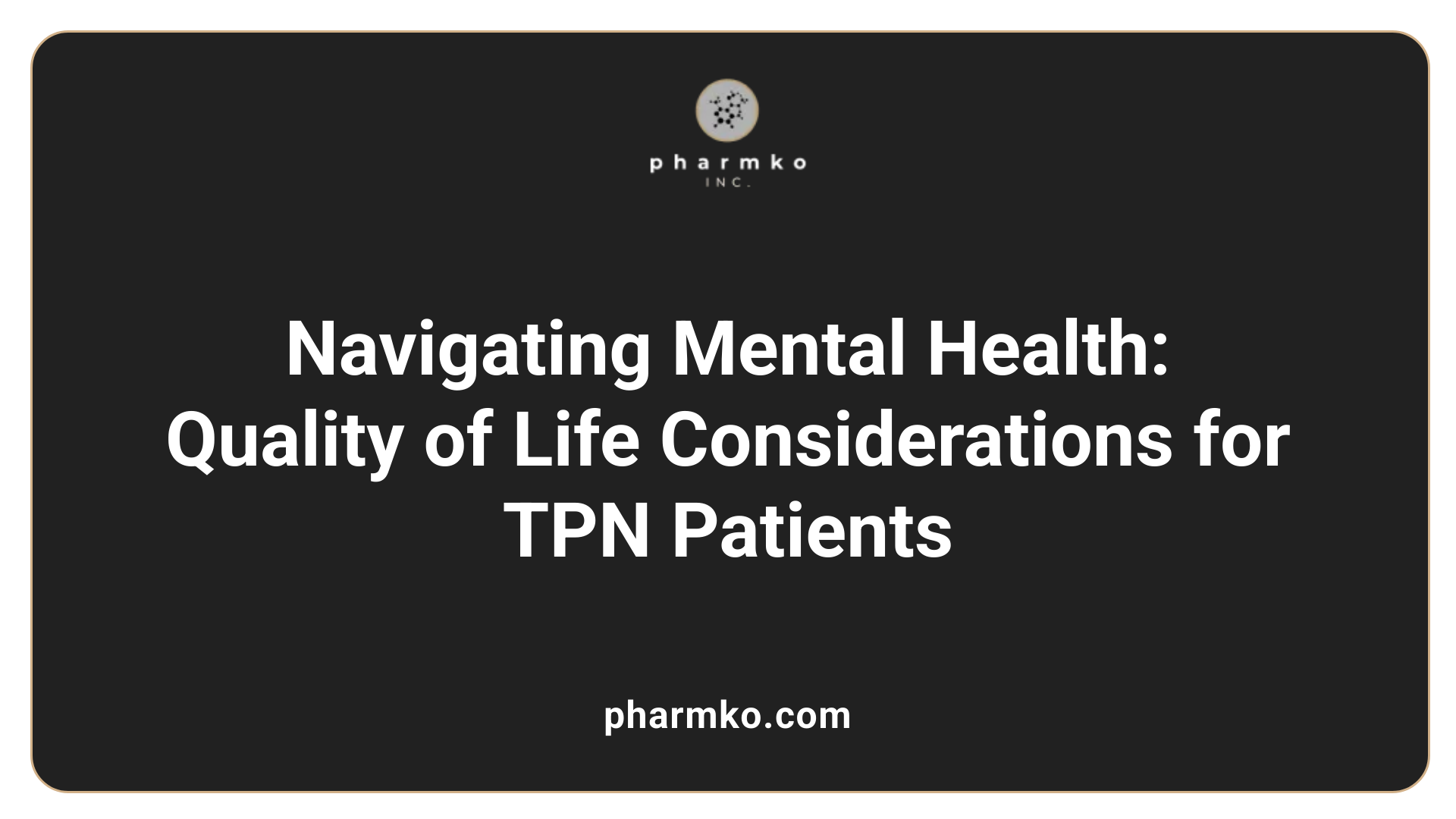
What are the adverse effects of Total Parenteral Nutrition (TPN)?
Total Parenteral Nutrition (TPN) can lead to several adverse effects, particularly affecting the hepatobiliary and musculoskeletal systems. Hepatobiliary complications include cholestatic hepatitis and cholelithiasis. In the musculoskeletal system, TPN may cause acute polymyopathy, often due to essential fatty acid deficiency, and low-turnover osteomalacic bone disease. Additionally, iatrogenic micronutrient deficiencies, such as those in chromium, selenium, and molybdenum, can have multisystem effects on the body. Proper management of these complications is crucial to prevent serious health issues associated with prolonged TPN use.
How does TPN affect mental health?
Living on TPN significantly impacts mental health, with studies revealing that approximately 50% of TPN patients experience symptoms of depression. Feelings of anxiety, loneliness, and negative body image are common, driven by the drastic lifestyle changes and the loss of traditional eating. Patients often perceive their dependence on TPN as a source of emotional distress, reporting issues such as loss of autonomy and social integration.
What is the quality of life for individuals on TPN?
Quality of life varies for individuals on TPN, with reports indicating that 70% consider their quality of life as reasonably good. However, 30% face challenges that lead to a poorer experience. Patients report feeling like a burden, which contributes to emotional distress and impacts family dynamics. Ensuring access to psychological support can greatly enhance their quality of life, helping them navigate these complex emotional challenges effectively.
Children and Adolescents on Parenteral Nutrition: Unique Challenges
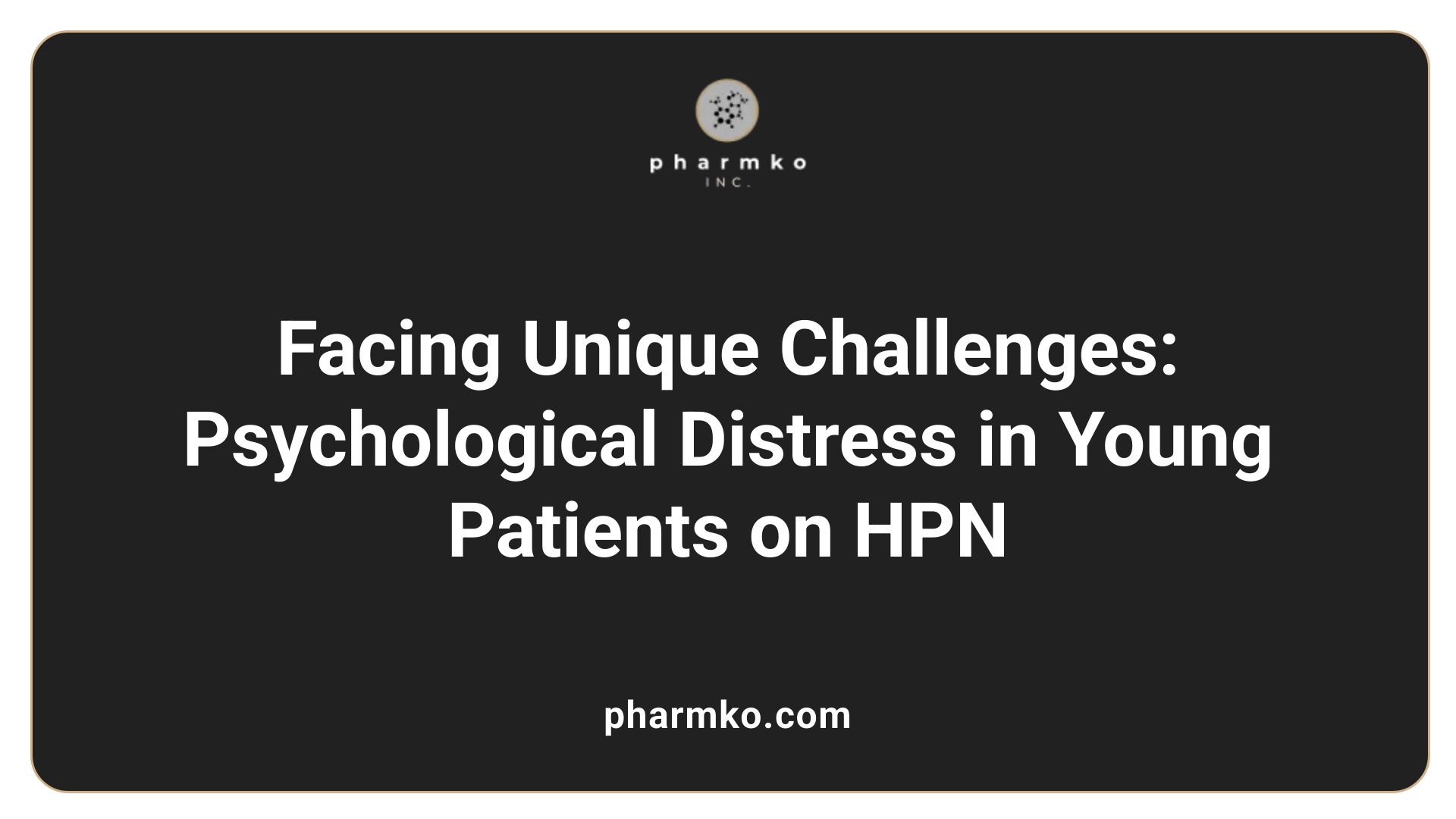
What are the psychological challenges faced by children on home parenteral nutrition (HPN)?
Children and adolescents relying on HPN often encounter significant psychological distress. Reports indicate high levels of anxiety and depressive symptoms, which can stem from their dietary restrictions and altered nutritional intake. The dependence on a machine for sustenance can lead to feelings of grief and loss, significantly influencing their emotional well-being.
How does HPN affect family routines?
Families of children on HPN frequently experience disruptions in their daily routines. The need for regular nutritional management can impose a structured but rigid schedule that affects family dynamics. Parents may grapple with feelings of guilt or helplessness, facing the challenge of balancing their child's medical needs with maintaining a semblance of normalcy within the household.
What adjustments are needed in pediatric care?
Pediatric care for children on HPN requires tailored adjustments to address both physical and psychosocial needs. Implementing comprehensive assessments that involve questionnaires for parents can help understand behavioral issues and enhance social integration. Providing emotional support not only for the patients but also for their families is crucial in mitigating the psychological impacts of living with HPN.
Psychosocial Support and Coping Mechanisms
How can patients find support?
Patients on parenteral nutrition (PN) face numerous challenges, including mental health issues like anxiety and depression. Establishing support groups can serve as a vital lifeline, providing a safe space for individuals to share their experiences and coping strategies. These groups often facilitate emotional resilience through shared understanding, ultimately fostering a sense of community.
What role does the community play?
Community involvement is crucial for enhancing quality of life for PN patients. Local organizations can offer resources like workshops, informational sessions, and meet-ups, connecting patients with others who understand their situations. Engaging in community activities allows for regular social interactions, which can counter feelings of isolation often experienced by patients.
Are there online resources available?
Numerous online resources exist that cater specifically to the needs of individuals on parenteral nutrition. Websites provide tools such as forums, mental health articles, and coping strategies that cover practical aspects and emotional support. These platforms allow patients to access information and shared experiences conveniently, broadening their support network beyond geographic limitations.
| Support Mechanisms | Description | Benefits |
|---|---|---|
| Support Groups | Local or virtual gatherings | Emotional sharing and community building |
| Community Involvement | Local workshops and meet-ups | Increased social interactions and engagement |
| Online Resources | Websites with forums and articles | Easy access to information and support |
By harnessing these resources, patients can improve their management of parenteral nutrition while addressing psychological needs.
Personal Experiences and Emotional Adjustments
Patient Testimonials
Personal stories from individuals on Home Parenteral Nutrition (HPN) often reveal the complexities associated with emotional adjustments. Many patients describe a journey filled with both challenges and affirmations. A common sentiment is the struggle between accepting dependence on the machine for life-sustaining nutrition and yearning for the normalcy of sharing mealtime with family and friends.
Emotional Adjustments
Adjusting to HPN can lead to a range of emotions. Patients frequently report feelings of grief over the loss of conventional eating experiences. Moreover, anxiety and depression are prevalent, with many expressing feelings of isolation stemming from their unique dietary restrictions. Emotional support becomes crucial as they navigate these adjustments.
Personal Coping Experiences
Coping strategies vary, with many patients finding solace in establishing routines that incorporate their nutritional regimen into daily life. Engaging in hobbies or connecting with peers who share similar experiences often helps counter feelings of loneliness. Additionally, maintaining open communication with family regarding emotional challenges can strengthen familial bonds and promote healing, highlighting the importance of support systems.
Navigating the Emotional Landscape of Parenteral Nutrition
Adjusting to life on parenteral nutrition involves managing a complex array of emotional challenges. While the medical aspects of TPN and HPN are well-documented, understanding the psychological implications is indispensable for enhancing patient care. Support systems, both familial and professional, play a pivotal role, as do personal coping mechanisms. By fostering resilience and providing psychosocial support, patients can navigate the emotional terrain more effectively, ensuring a better quality of life amidst the demanding reality of parenteral nutrition.
References
- Permanent total parenteral nutrition: psychological and social ...
- Psychological distress associated with home parenteral nutrition in ...
- [PDF] Top Tips for Managing the Psychological Well-being of Adults ...
- Adjusting to Life with IV Nutrition and Tube Feeding - Oley Foundation
- [PDF] Common psychiatric concerns in home parenteral nutrition1
- Home parenteral nutrition and the psyche: Psychological challenges ...
- Home parenteral nutrition and the psyche: psychological challenges ...
- MJCP | Mediterranean Journal of Clinical Psychology













